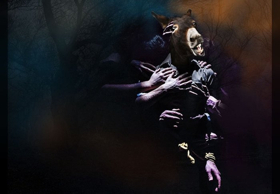Guest Blog: Director Mark Leipacher On A MIDSUMMER NIGHT'S DREAM

at Wilton's Music Hall
As contemporary theatre-makers who work predominantly with classic texts, at The Faction we're often asked to justify our choice of plays. Why that? Why now? Why is it relevant?
It's easy to take a play like A Midsummer Night's Dream for granted. "It's about fairies." "It's a great introduction to Shakespeare." "You can take your kids to it." All of that may be true - but there's so much more to it than first appears (more on that later).
It's also a play that has a logical programming slot. Sometimes, as audience members, we face the prospect of another Mechanicals-filled summer with a weary shrug. So you can imagine the conversation we've had to have with ourselves when the possibility of performing A Midsummer Night's Dream in the week after Midsummer itself came up.
Yet, there are always at least two versions of any famous Shakespeare text - and I'm not referring to the Folios and the Quartos. There's the play that we think we know because we've seen it so many times and it exists in our collective cultural consciousness, and there's the play that's actually written on the page. Sometimes, the gap between those two texts can be shocking.
Possibly the nicest thing that's been said about us is in a review is that there was the exhilarating sense that the ensemble had scrubbed their collective memories clear of the play's performance traditions (we were working on Twelfth Night then) and had come up with something terrifically fresh.
That's what we're striving for - a fresh take. We're aiming to still be playing A Midsummer Night's Dream's greatest hits, though the new material might surprise you, whether you're coming to the theatre for the first time or as a seasoned theatregoer, or visiting with your school (there's a special Thursday matinee for this reason).
Already, we've discovered textual evidence that Athens is a post-war environment and that feeling is hanging over the population; we're in a period of potentially catastrophic climate change (the seasons are literally back to front and upside down); and that the penalty for disavowing an arranged marriage is death. On top of all that, there's the furore around an imminent royal wedding. We're practically stumbling over contemporary resonances - it's a play for 2018.
So is this going to be a "dark" version of the play? Not intentionally - because that's not the entirety of the text. It's also hilarious; an extraordinarily joyful comedy that is about genuine mayhem. We're hoping to capture as many facets of the play as we can from moment to moment to moment.
The trick will be to pay as much attention to those darker, manic aspects as we do to the fun and adventurous ones. Hopefully, it'll be the excuse to go off the rails for a couple of hours or so and then, at the end of a dream that's both delightful and disturbing, re-emerge into reality a little bit altered.
The moon is referenced over 30 times in the play, seven of those in the first scene alone, so that will be a big feature of the production. Other than that, we don't want to put much in the space.
Architecture has always been an important consideration of how The Faction responds to a production, and when you have a gift like Wilton's Music Hall, we wouldn't want to hide it, or put things in front of it. It's a necessary part of the show - it'll lend us it's magic and majesty.
The Faction has become known for fusing an intelligent, interrogative approach to text with an imaginative ensemble physicality, and we're really excited about the physical invitations A Midsummer Night's Dream has - particularly in relation to the fairies.
We've already explored how the fairies might move in research and development sessions, and how we might create the ass's head with the arms and fingers of the ensemble: something that can be alive and organic, and imaginative. In that sense, we want to engage the audience's imaginations too.
A Midsummer Night's Dream at Wilton's Music Hall 26-30 June
Comments

Videos
.png)